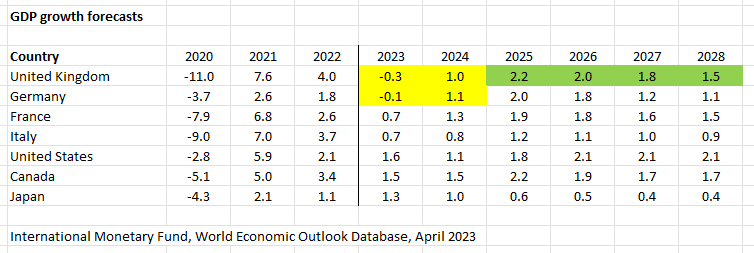According to the International Monetary Fund (IMF), the UK is predicted to be one of the worst performing major economies in the world this year. The IMF forecasts that the UK economy’s performance in 2023 will be the worst among the 20 biggest economies, known as the G20, which includes sanctions-hit Russia.
The IMF had previously forecasted that the UK would experience a downturn this year and be bottom of the pile of the G7. However, the UK topped the group in 2022 during the pandemic rebound. The IMF now expects the UK economy to shrink by 0.3% in 2023 and then grow by 1% next year.

The latest prediction from the IMF is slightly better than its previous expectation of a 0.6% contraction, made in January. However, IMF researchers have previously pointed to Britain’s exposure to high gas prices, rising interest rates, and a sluggish trade performance as reasons for its weak economic performance.
Chancellor Jeremy Hunt responded to the latest IMF’s predictions by saying, “Our IMF growth forecasts have been upgraded by more than any other G7 country. The IMF now say we are on the right track for economic growth. By sticking to the plan we will more than halve inflation this year, easing the pressure on everyone.”
On the other hand, Rachel Reeves, Labour’s shadow chancellor, said the estimates showed “just how far we continue to lag behind on the global stage”. “This matters not just because 13 years of low growth under the Tories are weakening our economy, but because it’s why families are worse off, facing a Tory mortgage penalty and seeing living standards falling at their fastest rate since records began,” she added.
Liberal Democrat Treasury spokesperson Sarah Olney said the forecast was “another damning indictment of this Conservative government’s record on the economy”.
A number of forecasters think the chances of a recession in the UK this year are declining. An economy is usually said to be in recession if it shrinks for two consecutive three-month periods.
The IMF’s new forecasts come against the backdrop of a world economy that continues to recover from both the pandemic and the Ukraine war energy shock. However, the IMF said there were concerns about the wider impact of recent fragility in global banking markets.
The IMF also warned of a “rocky road” for the global financial system, following the collapse of two US banks last month, closely followed by a rushed takeover of Swiss banking giant Credit Suisse by its rival UBS, which sparked fears of another financial crisis.
The IMF now expects global growth to fall from 3.4% in 2022 to 2.8% in 2023, before rising slowly and settling at 3% in five years’ time. However, it warned that if there is more stress in the financial sector, global growth could weaken further this year.
In addition, the IMF said it expects real interest rates – which take into account inflation – in major economies to fall to pre-pandemic levels because of low productivity and ageing populations. Central banks in the UK, the US, Europe and other nations have been increasing interest rates to combat the rate of price rises, otherwise known as inflation.




